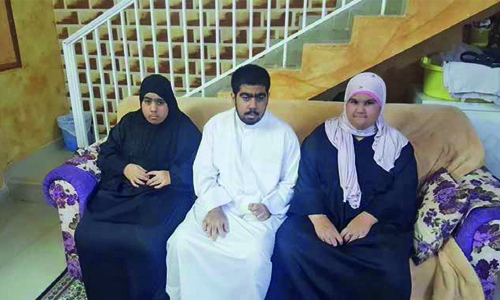A dad’s endless battle with destiny
Manama : Doctors around the world have warned of inbreeding caused by consanguineous marriages in the past few decades, as they say it could result into serious outcomes, such as the delivery of children with mental and physical disabilities and malformations.
AbdAli AbdulKareem, a Bahraini father of three mentally-challenged children, says consanguineous marriages within many generations in his family have turned out to be a “curse” on his three children and has made their lives miserable. AbdAli told Tribune that his children, two daughters (14, 18 years old) and a 24-year-old son, suffer from slight intellectual disability since birth. He says inbreeding is the main cause of his children’s illness.
But that’s not the children’s only ordeal, as he told that the three of them developed a rare genetic disease that causes gradual loss of sight. The Muharraq resident explained that both the son and the elder daughter have completely lost their eyesight, adding that his younger daughter is now beginning to lose the ability to see.
“All doctors who examined the three said the same thing. My children are diagnosed with a rare hereditary disease that effects the retina and there is no known cure for it.”
Misery
In March 2012, AbdAli lost a 19-yearold son to cancer. He said his son was the only healthy among his children and was a 12th standard student at the time he died.
The boy would suffer from a strange pain at the back of his neck and was later diagnosed with a spinal tumor by doctors at Salmaniya Medical Complex (SMC), few weeks after paying several “useless” visits to private hospitals.
The boy received chemotherapy at the oncology department at SMC for around six months. AbdAli said he took him to Turkey, where he underwent an operation in the upper discs of the spine. But the boy passed away two months after returning to Bahrain.
Everything happened quickly. The boy was three months away from graduating from high school and continuing his studies. He died eight months after the tumor was discovered,” AbdAli said.The man said, after reminiscing for a moment, “He was helping us take care of his siblings. He used to feed, clean and walk his brother around. Myself and his mum felt bad for him sometimes, as he was deprived of living an ordinary life, similar to children of his
age. We also think sometimes that God chose to end his misery and that it’s the time for him to rest.” AbdAli worked as a hotel laundry supervisor and was paid BD450 a month. He retired soon after his son’s sad demise, as taking care of the three children alone became a difficult task for his wife.
“I’m retired now and receive BD300 pension. BD185 is deducted by the bank and the remaining goes for the electricity and water services, telephone bills and other expenses. We receive a monthly allowance of BD100 from Labour and Social Development Ministry for each one of our disabled children.
All of our time is dedicated to caring for them. They’re dependent on us, especially the two older children. We hired a housemaid to help us care for them, but she couldn’t tolerate the situation and eventually escaped. Even friends and relatives are avoiding us now,” the man said while describing their unhappy situation.
I need a house
The Bahraini pleaded to the authorities to provide him with a house suitable for people with special needs. He explained that he was earlier given a housing loan of BD10, 000, which he used to buy the house they live in now within one of the old neighbourhoods of Muharraq.
AbdAli says the three-storey house, located in one of the alleys in “Freej Station” neighbourhood, besides the old Muharraq Market (Suq), is old, narrow and unsuitable for his children’s condition.
“Each of the top floors consists of one bedroom, where my children sleep. Climbing up and down the stairs without hurting themselves is almost impossible.
They need us to help them at all times. Plus, walking them for long distance to reach the car, which we park outside the narrow alley we live at, is exhausting. We need a house that’s more suitable for people with special needs,” AbdAli explained. He added, “I hope Housing Ministry will give me a one-storey house in one of the housing projects built in Muharraq or the surrounding villages and towns. My financial situations are tough, but I hope they can evaluate our house, maybe sell it, and use the amount as a down payment for a unit in one of the government housing projects.”
Related Posts

